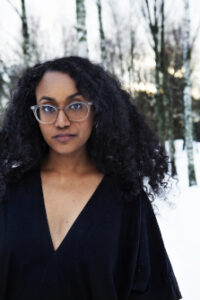Media Library
Interview with Judith Kiros
Queer-Bodied Voices
Ricardo Domeneck: Do we write differently as queer-bodied people living in our specific societies, which deal in specific manners with queer-bodied people? Can we speak of a queer-bodied poetics? How do you deal with this question?
Judith Kiros: Any attempt at defining a specific queer aesthetic – over and across cultures, over and across different types of bodies and modes of being – will, I believe, end up limiting what the aesthetics could potentially be or become. At the same time, shared experiences and spaces, and community-building and organizing, will give rise to (conscious and unconscious) similarities. A kind of fragmentation, perhaps, a play between restraint and release. A poetics of what Sara Ahmed calls willfulness. Something that connects the throat to the gut.
Ricardo Domeneck: Is the idea of a “queer tradition” important to you? Do you read and deal in a different way with your contemporary queer poets, as you do with homoerotic poetry from the past? Can you relate to poets such as Gertrude Stein and Oscar Wilde, to give two famous examples, from a time when language functioned differently, when “queer” meant something else?
Judith Kiros: Rather than thinking in terms of (one) tradition, I like to think of interconnected communities of struggle. In doing so, I find that there is more space for a kind of multiplicity, as well as a politics of identification ‘and’ solidarity. That way, writers such as Stein and Wilde can be approached from a position of both similarity and difference – which, to me, tends to also evoke a genuine curiosity regarding historical context, the text and its traditions, and its (and its readers’) possible futures. Also, I’d Alice B. Toklas the shit out of Gertrude.
Ricardo Domeneck: What intersectionality guides your work? How do notions of “national language”, “citizenship”, “national and ethnic identities” intersect with queerness for you?

Judith Kiros: To me, intersectionality is one of several analytical frameworks – it doesn’t necessarily guide my work. However, being invested in the idea of a world without borders – and having grown up as Swedish-Ethiopian – I work with and in several languages and traditions. As to queerness itself, I find that the term (or identity) in and of itself can be co-opted into serving a nationalist narrative; in Sweden, for instance, right-wing movements frequently try to market themselves as “queer-friendly” (unlike the racialized Other). However, coupled with the idea of an international class struggle, and as a community of struggle allied with others – I’m thinking specifically of migrants and asylum seekers – the queer community should unravel borders, bring down borders, and fuck the police (metaphorically, of course).
About the project QUEER-BODIED VOICES.
with Judith Kiros